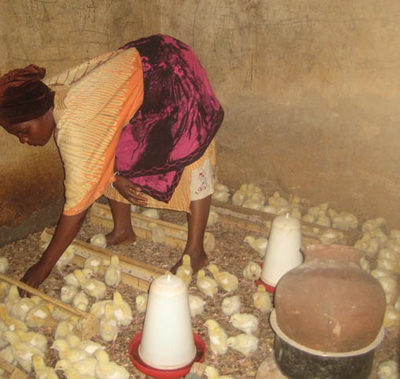
Uganda |
Entrepreneurs |
December 19, 2012 |
My chickens have helped put my kids through school
December 19, 2012

Zaina tends new chicks. Careful observation and feeding are key to sustainable farming and steady incom
Poultry raising has become popular in many households in Nansana, a suburb of Kampala, Uganda, as a way of providing food for the family table, and providing extra cash income. Zaina Nakiryowa is one of the poultry farmers in Nansana East 1B Zone specializing in rearing broilers. According to Nakiryowa, a person can start raising chickens even if they don't have much capital.
"All you need is to buy a few chicks, have a safe place to keep them, and make sure they are fed and watered. In six weeks you can sell your chickens and recover the original investment, plus a profit for yourself," Nakiryowa said. She started with 100 birds but she is now rearing over 300 chickens in a chicken coop behind her house.
As any other farm crop, careful care and feeding brings the best results. Nakiryowa feeds her chickens not only with maize, but also mukene (silver fish, for protein), cotton seed (for fats) and obusonko (crushed sea shells for calcium) to provide a healthy, fast growing chicken. Lots of water is needed to keep chickens happy and healthy. During the first three weeks, Nakiryowa must inject the birds every day with vitamins to assure healthy growth.
The farmer buys young chicks for shillings 1500-1700 each depending on the size. And if the chick thrives and grows to maturity it can sell after 6 weeks for 6,000 to 7,000, Nakiryowa explained. "But if you sell for only 6,000 or less, you don't make much profit," she said, adding "The cost of feed and medicine for the chickens goes up every month, But the price you get when you sell has not gone up as fast."
"When I started this project, poultry feed was cheap and readily available she said. Now, it is not so easy to find maize at a good price because so much is exported outside Uganda.
Besides the economic difficulties in poultry raising, there are many other challenges for the chicken farmer. "Thieves are always prowling around looking for chickens to steal, Nakiryowa says. And even some of my buyers steal from me. Its sometimes hard to get a proper count when you are loading chickens into a truck, and sometimes they will try to take more birds than they pay for.
Many poultry farmers have been cheated buying feed with sand or sawdust mixed in instead of maize, Nakiryowa says. Sometimes the drugs you buy are weak or too old, or completely fake. There are diseases that can wipe out a whole flock, and finally the market price is always changing so much. If the market price is too low when your chickens are ready to sell, you either take the low price, or keep the chickens longer and keep spending your money on feed, she said.
Despite the challenges Nakiryowa has benefited from her project and always uses some of her sales proceeds to keep the business growing. Since my farm is still small, whenever I sell broilers I buy more chickens to add on my farm and use the rest of the money to take care of my family, she said.
She has six children, four boys and two girls. The girls have completed senior six this year and are in their vacation while the boys finished their university studies and three are working. Over the years, it is thanks to the chickens that my children have received their education. I am grateful to them for that, Nakiryowa says.
"All you need is to buy a few chicks, have a safe place to keep them, and make sure they are fed and watered. In six weeks you can sell your chickens and recover the original investment, plus a profit for yourself," Nakiryowa said. She started with 100 birds but she is now rearing over 300 chickens in a chicken coop behind her house.
As any other farm crop, careful care and feeding brings the best results. Nakiryowa feeds her chickens not only with maize, but also mukene (silver fish, for protein), cotton seed (for fats) and obusonko (crushed sea shells for calcium) to provide a healthy, fast growing chicken. Lots of water is needed to keep chickens happy and healthy. During the first three weeks, Nakiryowa must inject the birds every day with vitamins to assure healthy growth.
The farmer buys young chicks for shillings 1500-1700 each depending on the size. And if the chick thrives and grows to maturity it can sell after 6 weeks for 6,000 to 7,000, Nakiryowa explained. "But if you sell for only 6,000 or less, you don't make much profit," she said, adding "The cost of feed and medicine for the chickens goes up every month, But the price you get when you sell has not gone up as fast."
"When I started this project, poultry feed was cheap and readily available she said. Now, it is not so easy to find maize at a good price because so much is exported outside Uganda.
Besides the economic difficulties in poultry raising, there are many other challenges for the chicken farmer. "Thieves are always prowling around looking for chickens to steal, Nakiryowa says. And even some of my buyers steal from me. Its sometimes hard to get a proper count when you are loading chickens into a truck, and sometimes they will try to take more birds than they pay for.
Many poultry farmers have been cheated buying feed with sand or sawdust mixed in instead of maize, Nakiryowa says. Sometimes the drugs you buy are weak or too old, or completely fake. There are diseases that can wipe out a whole flock, and finally the market price is always changing so much. If the market price is too low when your chickens are ready to sell, you either take the low price, or keep the chickens longer and keep spending your money on feed, she said.
Despite the challenges Nakiryowa has benefited from her project and always uses some of her sales proceeds to keep the business growing. Since my farm is still small, whenever I sell broilers I buy more chickens to add on my farm and use the rest of the money to take care of my family, she said.
She has six children, four boys and two girls. The girls have completed senior six this year and are in their vacation while the boys finished their university studies and three are working. Over the years, it is thanks to the chickens that my children have received their education. I am grateful to them for that, Nakiryowa says.
Members may post a comment.







